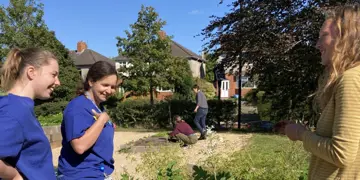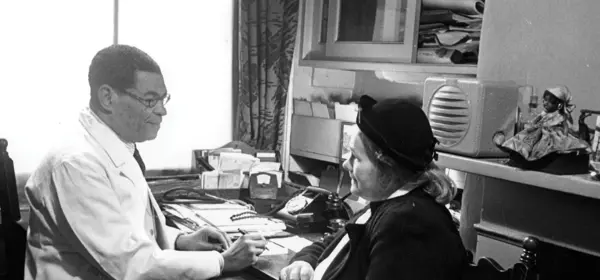Root cause
Root cause
Making the health service more sustainable will improve not only the environment but the nation’s health, and everyone has a role to play
Against the dark clouds, it’s easy to miss the good news stories unfurling across the NHS. They tend to be small and local – and green.
Trials are under way using drones to fly chemotherapy medicine across the Solent to the Isle of Wight, and electric ambulances have been pressed into service in north-west England and the Midlands.
A hospital near Hull is now fully powered during the daytime by an 11,000-panel solar farm. These innovations are still in their infancy, but the NHS is making good progress towards its net-zero emissions targets. It must: the NHS accounts for more than 4 per cent of the UK’s emissions.
And it needs to change faster. The worsening health effects of the climate and environmental crises are impossible to ignore. Last year’s summer heatwaves caused 2,800 excess deaths among those aged 65 and above in England alone; extreme heat on 19 July crashed IT servers at Guy’s and St Thomas’ hospitals in London, causing chaos for weeks. Food supplies shrivelled on their stalks.
Every bit of decarbonisation we achieve, every bit of warming we prevent, it all helps
Dr Gopfert
Last year’s report by England’s chief medical officer Chris Whitty said poor outdoor air quality contributes to 36,000 deaths a year in the UK. The heated debate about global warming can be overwhelming.
But there is a large and growing band of sustainability champions in the NHS – including many doctors – who are determined to remain optimistic and to see challenge as opportunity.
‘The climate and ecological crisis is the defining health crisis of our time,’ says climate campaigner and public health registrar Anya Gopfert.
‘Whether you choose to make it part of your job or not, it will become part of your job.
‘We need major change, with everybody on board. Every bit of decarbonisation we achieve, every bit of warming we prevent, it all helps. And there are huge benefits: much of the change we need to see to make healthcare more sustainable is doing less but doing it better.’
Better-quality care
Frances Mortimer left clinical medicine, reluctantly, to devote herself to helping the health service become more environmentally responsible. She helped set up the CSH (Centre for Sustainable Healthcare) in Oxford in 2008 and as its medical director works with all levels of health systems, from individuals to specialties to organisations, to help ‘mainstream sustainability’.
CSH’s work is wide-ranging, everything from establishing fellowships to support specialty-specific research into greener practice and process, to helping health sites create green spaces as part of an NHS Forest, to helping trusts develop green plans.
Among the innovative pilots it has supported, often in the context of inter-team competitions, are many ‘Green Surgery’ projects. For example, the Leeds Global Health Research Group has designed a mechanical device that enables keyhole appendicectomy without the need for medical gases, which have a large carbon footprint.
As well as focusing on low-carbon alternatives, there is also a strong emphasis on streamlining care and processes.
A CSH-supported pilot in Southampton which trialled early mobilisation and intensive physio for heart-surgery patients was found to reduce patients’ time in resource-intense ICU, for example.
Dr Mortimer says interest in sustainable healthcare and CSH support has grown rapidly over the past three years. Yet, the picture is patchy: almost a third of trusts surveyed recently by the BMA were not monitoring their emissions – and 16 per cent of trusts that were monitoring emissions in 2020 had stopped doing so in 2021.
For those more wary about ‘going green’, CSH’s strong emphasis on quality improvement is surely compelling: all projects are assessed on their health outcomes as well as financial, social and environmental cost savings.
‘Most people don’t disagree that sustainable healthcare is a good thing,’ says Dr Mortimer. ‘They just don’t have time to think about it. Or they think it’s going to be about a recycling bin. It’s about showing them what’s achievable, what others are already doing. But if we don’t connect it to better quality care, it isn’t going to have traction because that’s the prime motivation for the whole health service.’
Partnership with patients
Primary care is a relatively minor contributor to the NHS’s carbon footprint but its potential to contribute to wider change is significant. GP registrar Advaith Gummaraju is an enthusiastic advocate of the Green Impact for Health Toolkit, created by the Royal College of GPs, which has helped him and his colleagues at their Oxfordshire surgery become more sustainable.
The practice uses a council-owned building, but they have been able to make swaps such as LED lighting and recycled paper, as well as cuts in energy and PPE use. They’re also committed to low-carbon pharmaceutical options, where appropriate: dry-powder inhalers are 25 times less polluting than metered-dose inhalers, for example.
But it’s the potential for influence through the closer doctor-patient relationship in primary care that most excites Dr Gummaraju. A large part of sustainable healthcare is health promotion and prevention – or what Dr Mortimer of CSH refers to as ‘helping patients be partners in their own care’.
Dr Gummaraju believes helping people understand the links between human and planetary health can help them adopt better lifestyle choices, which tend to be more sustainable too.
‘A lot of the chronic diseases that we see in general practice are exacerbated by things like air quality, poor diets low in plant matter, low levels of physical activity,’ he says.
‘I find people are generally receptive to things they could change to make their lives better. ‘An emphasis towards self-management, prevention, better disease control, as opposed to letting things get to a stage in which they need to become medicalised, can only reduce the GP workload and make our work more rewarding.’
Dr Gummaraju may sound ambitious but he has made a conscious choice to move away from ‘climate doom’ and reframe the debate around positive action.
‘There are things that we can all do, to start to enact bottom-up changes. As we start to make changes within our lifestyles and our professional lives, and influence the communities around us, that can trickle upwards towards wider action on a global scale.’
Speak truth to power
Of course, individual clinicians, even individual health organisations, are limited in their ability to effect and influence wider change. Switching to LED lightbulbs is one thing; retrofitting an ageing NHS estate is an entirely different proposition.
The solar farm powering Castle Hill Hospital near Hull was made possible by a £4.2m government grant through the Public Sector Decarbonisation Scheme. Yet, over half (54 per cent) of the organisations that responded to the BMA’s recent emissions survey said they had not received funding for sustainability initiatives. On average, three-quarters (75 per cent) of their energy usage still relied on fossil fuels.
Furthermore, the NHS’s own carbon footprint – the emissions it controls directly – is only part of the picture. Reducing ‘the NHS carbon footprint plus’ – the emissions it can influence, such as its supply chain or patient/staff travel – is much more complex.
That’s why Bill Stableforth, a consultant gastroenterologist in Cornwall, stresses the need to join with like-minded others, to build momentum as well as for mutual encouragement.
Chronic diseases we see in general practice are exacerbated by things like air quality
Dr Gummaraju
A staff meeting in a lecture hall was the catalyst for Royal Cornwall Hospitals Trust declaring a climate emergency and later setting a net-zero target of 2030. Climate action at trust level needs to go hand in hand with advocacy at national level, Dr Stableforth believes, and to be effective, advocacy needs to build movements for change.
‘The NHS is leading the world towards net-zero but it needs to happen rapidly. And the NHS is constrained in many ways, most importantly by everything being so busy: people can’t draw breath to think about this stuff,’ he says.
‘We need to put the onus to act on the Government and the fossil fuel industry. Telling individuals to go and buy a bamboo toothbrush is a deflection tactic: that’s not the answer. But when healthcare people speak up on these issues, people listen. ‘What’s not to like about cleaner air, safer streets, less noise, less pollution, being able to go and see your mates on your bike, your children playing in the street?’
Start somewhere
Like Dr Mortimer, Dr Gopfert believes that addressing climate change is critical to the future of health and healthcare, and she’s shifted her focus away from clinical work towards policy change.
‘For me, everything else is dwarfed by this issue,’ says Dr Gopfert, who’s based in Devon. Encouraging others to understand and engage with it too has become an important part of her work. The Faculty of Public Health’s Sustainable Development Special Interest Group, which she co-chairs, now offers ‘reverse mentoring’ where junior practitioners work with more senior members to communicate why action on climate change and health is so important to them and to ensure that they use their seniority to enact change.
She is working with UCLPartners, a health innovation partnership on a mission to solve the biggest health challenges through research and innovation. One focus of its climate work is considering the feasibility of trusts engaging in power purchase agreements (long-term energy contracts) that invest in renewables capacity.
Find the thing that you feel able to do, find good people to do it with, and then start tomorrow
Dr Gopfert
But Dr Gopfert urges people to find their own role in this – whether that’s introducing change to their team, lobbying their institution or pushing for wider systemic change.
Like Dr Gummaraju, she encourages people to connect with others who can offer ideas and support, and to try different things, whether that’s giving a talk at a grand round or asking questions of employers. And she urges doctors to write to their MP, taking advantage of their status as ‘trusted messengers’.
‘Find the thing that you feel able to do, find good people to do it with, and then start tomorrow: don’t delay. We need people to try things and learn from them. ‘And don’t be thwarted by failure: it just provides lessons for the next time. And make sure it’s a little bit fun because that’s what keeps you going.’
- Until September 2024, resident doctors were referred to as ‘junior doctors’ by the BMA. Articles written prior to this date reflect the terminology then in use






